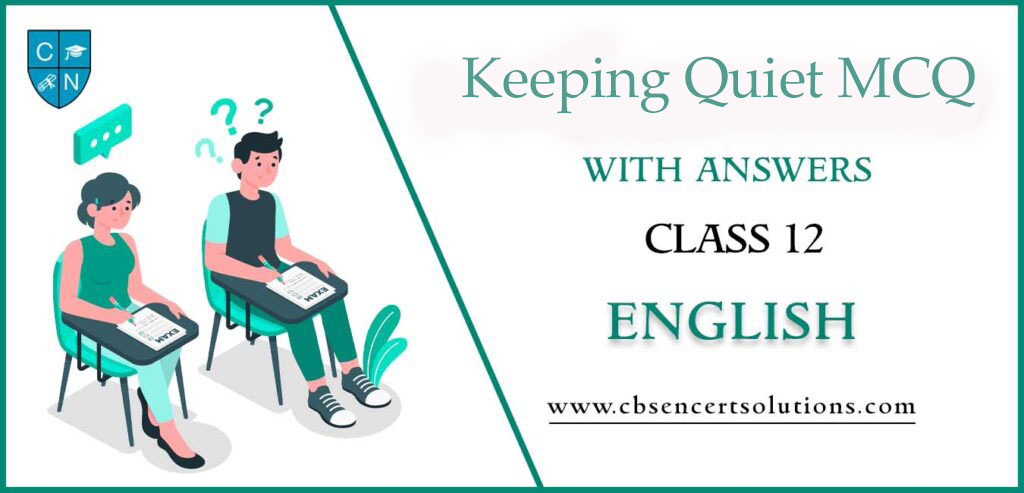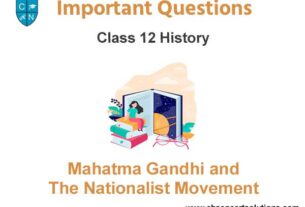Check the below NCERT Class 12 English Flamingo Chapter 8 Keeping Quiet MCQ with Answers available with PDF free download. MCQ Questions for Class 12 English Flamingo with Answers were prepared based on the latest syllabus and examination pattern issued by CBSE, NCERT, and KVS.
Our teachers have provided below Keeping Quiet Class 12 English Flamingo MCQs Questions with answers which will help students to revise and get more marks in exams.
Class 12 English Poem 3 Keeping Quiet MCQ by Pablo Neruda has been gathered for students to rehearse. Students can prepare these MCQs of Keeping Quiet from the NCERT Flamingo book. Each question has four choices with the right answers.
Firstly, Solve all these Questions and check your answer with the given answer. If your answers do not match with the right answer, Don’t worry try again because You need to prepare daily to score higher marks in the Class 12 Exam.
Keeping Quiet Summary in Hindi (Video)
We recommend students of class 12 watch this video summary of the poem Keeping Quiet. This video summary will help you to understand the poem in a better way so that you can score good marks in keeping quiet MCQ
In this video, you will get full insights into this poem Keeping quiet. This short Hindi summary will help you to answer MCQ questions for the keeping quiet poem.
Keeping Quiet MCQ Questions for Class 12 English Flamingo with Answers
Refer below for Class 12 English Flamingo Chapter 8 Keeping Quiet MCQ Questions with solutions. Solve questions and compare with the answers provided below
MCQs
Question. What does the poem speak about?
A) the necessity to be happy
B) the necessity to introspect, understand and have feelings of brotherhood
C) the necessity to work quietly
D) none
Answer
B
Question. What is the original language of the poem?
A) English
B) French
C) Pali
D) Spanish
Answer
D
Question. According to the poet what creates barriers?
A) interactions
B) reactions
C) fighting
D) languages
Answer
D
Question. Why does the poet ask people not to speak?
A) because it creates noise
B) he doesn’t like noise
C) it makes things unpleasant
D) because it creates barriers or obstacles in the form of misunderstanding amongst people
Answer
D
Question. How will keeping quiet protect our environment?
A) by creating peace and brotherhood feelings
B) no noise will be there
C) people will not fight
D) none
Answer
A
Question. What is destroying the environment?
A) unthoughtful actions
B) violent actions
C) speaking without thinking
D) All
Answer
D
Question. What does the number 12 represent?
A) hours of the day and months of a year
B) earth
C)clock
D) cricket players
Answer
A
Question. What does the poem Keeping Quiet teach us?
A) how to maintain silence
B) not to make noise
C) speaking creates noise
D) To be peaceful, thoughtful, and have feelings of brotherhood
Answer
D
Question. Not move our arms’ what does this expression refer to?
A) sit quietly
B) stand quietly
C) to be inactive
D) sitting still without any movement
Answer
D
Question. Why is silence treated as a big issue?
A) it helps to search our soul
B) helps us to analyze our actions
C)helps us to be thoughtful and find our true self
D)All these
Answer
D
Question. What should not be confused with total inactivity or death?
A) no movement
B) a statue
C) talking people
D) Stillness and silence
Answer
D
Question. What is the sadness in the poem that the poet speaks about?
A) violence because of unthoughtful action of the people
B) unnecessary movements
C) speaking aloud
D) fighting
Answer
A
Question. What does the earth symbolize?
A) perseverance and new beginning from seemingly stillness
B) stillness
C) greenery
D) prosperity
Answer
A
Question. What is always alive even when everything seems to be dead or still?
A) mountains
B) rivers
C) Sun
D) Earth and nature are always alive
Answer
D
Question. Why does the poet request people to keep quiet?
A) to maintain silence
B) to avoid noise
C)to be friendly
D)in the hope of becoming more thoughtful and peaceful
Answer
D
Question. What does the poet want people to do for one second?
A) to sing
B) to close eyes
C)to stand quietly
D)to be silent and motionless
Answer
D
Question. Why is the moment of silence called Exotic?
A) because of the beautiful scenery around
B) because of the gathering
C) because of large gathering
D) because of perfect peace and harmony
Answer
D
Question. What would everyone feel at that exotic moment?
A) happy
B) content
C) dancing
D) strange blissful oneness
Answer
D
Question. How long is the poet expecting everyone to stay still?
A) for 10 minutes
B) for12 minutes
C) for15 minutes
D) for 1 second till we count 12
Answer
D
Question. Why is the poet asking everyone not to speak any language?
A) to avoid noise
B) to avoid loud voices
C) to avoid people
D)to avoid conflicts and misunderstandings
Answer
D
Question. While gathering salt, what will happen to the man if he keeps silent for a moment?
A) he will stop dropping it
B) he will look at the ground
C)he will walk carefully
D)he will think of the harm the salt is doing to his hands
Answer
D
Question. Which images in the poem show that the poet condemns or hate violence?
A) fishermen not harming whales
B) wars leaving behind no survivors to celebrate
C)poet’s refusal to deal with death
D)All these
Answer
D
Question. What are the different kinds of wars mentioned in the poem?
A) War against humanity
B) War against nature
C) War with gases and fire
D) All these
Answer
D
Question. What is the poet’s pen name?
A) Pablo Neruda
B) Pable
C) Pablo
D)Neruda
Answer
A
Question. What is the poet expecting from fishermen?
A) to find more fish
B) to go deeper into the sea
C) to think and stop harming the fish
D) none
Answer
C
Read the extract given and answer the questions that follow
For once on the face of the Earth
Let’s not speak in any language,
Let’s stop for one second
And not move our arms so much.
Question. a. Name the poet. Pablo Neruda
b. Name the Poem. Keeping Quiet
c. Why does the poet want us to keep quiet?
A) to maintain silence
B) to avoid noise
C) tranquil moment will help find solutions to our problem
D) in the hope of becoming more thoughtful
Answer
C
Question. What does he want us to do for one second?
A) to be still for one second
B) To keep quiet and not speak
C) stop all activities
D) All the above
Answer
D
Question. What does Neruda mean when he says ‘not move our arms’?
A) Means we should be in a state of total inactivity
B) We should not harm others
C) There should not be any wars and no violence.
D) all the above
Answer
D
It would be an exotic moment
Without rush, without engines,
We would all be together
In a sudden strangeness.
Question. Name the poet . Pablo Neruda
b. Name the Poem. Keeping Quiet
c. What would be an exotic moment?
A) making noise
B) Keeping quiet
C) singing together
D) dancing together
Answer
B
Question. Why would it be called an exotic moment?
A) because it will be pollution free environment
B) there will be heavenly flow of wind
C) the whole world will be enveloped in quietness
D) flora and fauna will grow
Answer
Question. How would we feel at that moment?
A) There will be strange togetherness
B) there will be no discrimination
C) There will be harmony and brotherhood
D) All the above
Ans (D)
Answer
D
Question. What is the poetic device used in the phrase “we would”?
A) Imagery
B) antithesis
C) alliteration
D) repetition
Ans (C)
Answer
C
Fishermen in the cold sea,
Would not harm whales
And the men gathering salt
Would look at his hurt hands.
Question. What does the poet want the fishermen to do?
A) Not harm the whales
B) To introspect
C) Not to indiscriminately harm nature
D) All the above
Answer
D
Question. What would the man gathering salt do?
A) He would also introspect
B) He would look at his hurt hands
C) He would get a moment to realize his folly.
D) All the above.
Answer
D
Question. What message does the poet give in these lines?
A) The desire of man for progress and advancement has done more destruction than development.
B) Human beings are Oblivious of the pain they are causing to themselves.
C) They have no care and concern for his fellowmen.
D) All of the above.
Answer
D
Question. What is the poetic device used in ‘ hurt hands’ ?
A) Simile
B) metaphor
C) alliteration
D) Onomatopoeia
Answer
C

Answer in 30-40 words
Question. What will counting to twelve and keeping quiet help us achieve?
Ans. The poet asks each one of us to count twelve and then be quiet, silent, and motionless so that at least for once on the surface of the earth no language will be spoken. We will be able to meditate, reflect and introspect in silence. It will help us to achieve a sense of togetherness among all, a condition which is important for the survival of humanity.
Question. What is the sadness that the poet, Pablo Neruda, refers to in the poem, ‘Keeping Quiet’?
Ans. The poet refers to the sadness, which surrounds man due to not having any time for himself, of not understanding what he and his fellowmen want. He has no time for introspection, as a result, he is not able to analyze his own actions and understand their consequences.
Question. Do you think the poet advocates total inactivity and death? Why?
Ans. No, the poet does not advocate total inactivity or death. He clearly states that his asking for stillness should not be confused with inactivity. He only wants to stop inhuman and destructive activities particularly those involved in the war. He wants to live in peace.
Question. What are the different types of wars mentioned in the poem? What is Neruda’s attitude towards these wars?
Ans. The poet mentions war against humanity and nature. Green wars, wars with poisonous gases, and wars with fire do no good to anyone.
Neruda feels that such wars may bring victory but there are no survivors. It is a hollow victory. It means there is a heavy loss on both sides.
We hope you liked English Flamingo Chapter 8 Keeping Quiet Class 12 MCQ with answers provided above. In case you have any queries in regard to MCQ of Keeping Quiet please write in the comments section given below and our English Flamingo teachers will provide a response.

Nice 😊help ful for student to understand poem internally
Yes, you are correct 😁😁😁😁😁😁